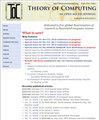Inapproximability of NP-Complete Variants of Nash Equilibrium
IF 0.7
4区 计算机科学
Q4 COMPUTER SCIENCE, THEORY & METHODS
引用次数: 35
Abstract
In recent work of Hazan and Krauthgamer (SICOMP 2011), it was shown that finding an e-approximate Nash equilibrium with nearoptimal value in a two-player game is as hard as finding a hidden clique of size O(log n) in the random graph G(n, 1/2). This raises the question of whether a similar intractability holds for approximate Nash equilibrium without such constraints. We give evidence that the constraint of near-optimal value makes the problem distinctly harder: a simple algorithm finds an optimal 1/2 -approximate equilibrium, while finding strictly better than 1/2 -approximate equilibria is as hard as the Hidden Clique problem. This is in contrast to the unconstrained problem where more sophisticated algorithms, achieving better approximations, are known. Unlike general Nash equilibrium, which is in PPAD, optimal (maximum value) Nash equilibrium is NP-hard. We proceed to show that optimal Nash equilibrium is just one of several known NP-hard problems related to Nash equilibrium, all of which have approximate variants which are as hard as finding a planted clique. In particular, we show this for approximate variants of the following problems: finding a Nash equilibrium with value greater than η (for any η > 0, even when the best Nash equilibrium has value 1 - η), finding a second Nash equilibrium, and finding a Nash equilibrium with small support. Finally, we consider the complexity of approximate pure Bayes Nash equilibria in two-player games. Here we show that for general Bayesian games the problem is NP-hard. For the special case where the distribution over types is uniform, we give a quasi-polynomial time algorithm matched by a hardness result based on the Hidden Clique problem.纳什均衡的np -完全变异体的不可逼近性
Hazan和Krauthgamer (SICOMP 2011)最近的研究表明,在两人博弈中找到一个接近最优值的e-近似纳什均衡,就像在随机图G(n, 1/2)中找到一个大小为O(log n)的隐藏集团一样困难。这就提出了一个问题:在没有这些约束的情况下,近似纳什均衡是否也存在类似的难解性?我们给出的证据表明,近最优值的约束使问题明显困难:一个简单的算法找到最优的1/2 -近似均衡,而找到严格优于1/2 -近似均衡与隐藏集团问题一样困难。这与无约束问题形成对比,在无约束问题中,已知更复杂的算法可以获得更好的近似值。与PPAD中的一般纳什均衡不同,最优(最大值)纳什均衡是np困难的。我们继续表明,最优纳什均衡只是几个已知的与纳什均衡相关的np困难问题之一,所有这些问题都有近似的变体,就像找到一个固定的集团一样困难。特别是,我们在以下问题的近似变体中证明了这一点:找到一个值大于η的纳什均衡(对于任何η > 0,即使最佳纳什均衡的值为1 - η),找到第二个纳什均衡,以及找到一个具有小支持的纳什均衡。最后,我们考虑了二人博弈中近似纯贝叶斯纳什均衡的复杂性。这里我们证明,对于一般贝叶斯对策,问题是np困难的。对于类型分布均匀的特殊情况,我们给出了基于隐团问题的拟多项式时间算法与硬度结果匹配。
本文章由计算机程序翻译,如有差异,请以英文原文为准。
求助全文
约1分钟内获得全文
求助全文
来源期刊

Theory of Computing
Computer Science-Computational Theory and Mathematics
CiteScore
2.60
自引率
10.00%
发文量
23
期刊介绍:
"Theory of Computing" (ToC) is an online journal dedicated to the widest dissemination, free of charge, of research papers in theoretical computer science.
The journal does not differ from the best existing periodicals in its commitment to and method of peer review to ensure the highest quality. The scientific content of ToC is guaranteed by a world-class editorial board.
 求助内容:
求助内容: 应助结果提醒方式:
应助结果提醒方式:


